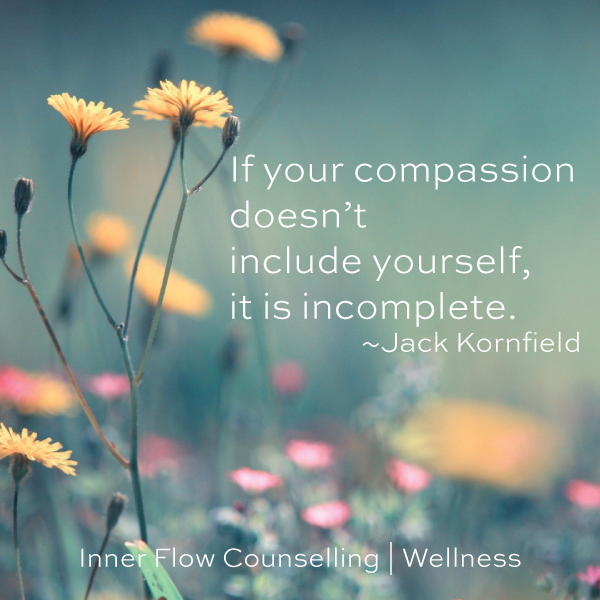
Do you feel overwhelmed by critical thoughts? Do you constantly judge yourself or feel that no matter what you do, you are never good enough?
At times I, like everyone else, can feel like I am suffocating under the pressure created by what many call the Inner Critic. What I have discovered is the Inner Critic is a learned tool; it is based on fear. It is a way that I try to keep myself safe from the judgment of others. The rationale; if I judge myself first, then other people’s judgement won’t hurt me as much. It took a long time to understand that I was hurting myself in a much deeper way than anyone else possibly could.
Fear is a natural instinct meant to keep us safe. The inner critic is fear in overdrive, causing our sympathetic nervous system (this is our fight, flight, freeze, please response) to be highly activated. The good news is learning to regulate our nervous systems is a giant step towards lessening the Critic’s grip on our lives.
The Inner Critic develops from inner and outer pressures to live up to some ideal. The Inner Critic is all the ‘shoulds’ and ‘should nots’ that influence our experience; it shows up in all the ways we don’t accept who we are. What we do not realize is when we try to be someone other than our true self, we negate all that we already are.
I have learnt that if I let myself acknowledge and accept all aspects of myself, comfortable and uncomfortable, I am rewarded with a sense of freedom. I started a practice of radical self-acceptance through somatic awareness, and now I practice self-empathy instead of self-criticism. I am learning that by listening to the intelligence of my body – what I call my Inner Wisdom – I am guided through life with love, compassion, and understanding. My relationship with myself is more satisfying, as is my relationship with others.
Five Somatic skills to help
1. Identify your Inner Critic
Identify how and when your critical voice shows up. What does it tend to focus on? Who does it remind you of? Is it based on personal history or societal expectations?
Begin by receiving – rather than resisting – your Inner Critic; it takes a lot of energy to deny aspects of yourself that have been labelled as wrong. You are experiencing them for one reason or another. Try witnessing your thoughts without judging them as bad or good, and be open to exploring what lessons they may hold for you. This means that you are not those thoughts. You can witness them appear, yet you do not get caught up in them; they stop running the show.
2. Begin paying attention to your breath
Bringing awareness and attention to your breath is one of the most basic and profound actions you can take to help regulate your nervous system. Breathing practices expand your capacity to be with yourself as you become aware of your Inner Critic. When you choose to breathe consciously, it becomes an anchor that stabilizes you. A practice of diaphragmatic breathing (belly breathing) helps you stay with yourself during uncomfortable states and will help bring your nervous system into balance.
3. Practice self-empathy
Place your hand on your heart. Breathe in and out, and notice your feelings. In order to experience self-empathy, your heart must be involved. Feeling compassion for your own struggles automatically initiates a healing process.
When you catch yourself in the clutches of your Inner Critic, place your hand(s) on your heart. Connect to your Inner Wisdom by speaking gently and compassionately to yourself. You might say, “Inner Critic (or whatever name you call it) I know you’re afraid and you are just trying to protect me but I trust in my capacity to do this, be here, etc…“ Treat yourself as you would your closest friend. Remember, you already have the inner resources to transform and support yourself. Trust that you can give yourself what you need in each moment.
4. Develop somatic awareness
Somatic awareness leads to radical self-acceptance by attuning us to the intelligence of our body. What is your felt sense when your head is full of critical thoughts? Where are you holding tension or experiencing pain? What is the quality of your breath? Simply become aware of the different bodily sensations and how they are connected to your thoughts and emotions. Somatic awareness involves gently and compassionately paying attention to the ebb and flow of sensations throughout your body and nervous system. While initially, the practice of somatic awareness can be overwhelming, over time, you will learn that you are a flow of sensations, forever transforming. In this way, you learn to surf both the rough waves and the calm waters.
5. Play with movement and have fun!
What did you learn from your somatic awareness? Is there a certain posture you hold while in the critical voice? What happens if you shift your posture or break out into an expressive dance? What yoga pose would express the opposite of the critical voice; what posture expresses your Inner Wisdom? Have fun exploring and expressing your wide range of emotional and mental states through your body.
